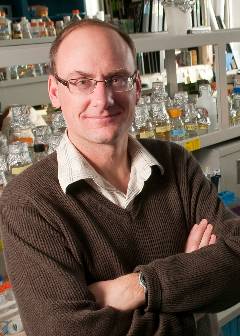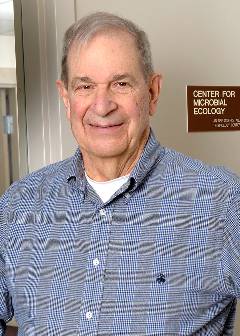NatSci scientists among the world’s most cited researchers
Article Highlights
- MSU Research Foundation Professor and University Distinguished Professor Gregg Howe and University Distinguished Professor Emeritus James Tiedje have earned spots on Highly Cited Researchers 2023, this year’s edition of an annual list compiled by the analytics firm Clarivate.
- This honor is given to scientists who author multiple research papers that have proven to be among the most useful to their peers.
- The two researchers from the College of Natural Science were among five Michigan State University scientists included on this year’s list of Highly Cited Researchers.
Gregg Howe and James Tiedje of the College of Natural Science were recognized for being among the world’s most influential scientists.
The two are part of the annual list of Highly Cited Researchers, compiled by the analytics firm Clarivate.
Howe and Tiedje are among five Michigan State University researchers to earn this honor, which is bestowed to scientists who author multiple research papers that have proven to be among the most useful to their peers.
This is measured by the number of citations their papers receive, but inclusion is also contingent upon qualitative analysis and expert judgement, according to Clarivate.

Howe is an MSU Research Foundation Professor and University Distinguished Professor of biochemistry and molecular biology with the MSU-DOE Plant Research Laboratory and the Plant Resilience Institute in the College of Natural Science.
He is an internationally recognized leader in research on plant hormone biology and how plants defend themselves in response to insects and other environmental stresses.
Howe was elected to the National Academy of Sciences in 2020 in recognition of his distinguished and continuing achievements in original research. He was also selected as a Fulbright U.S. Scholar for the 2022-2023 academic year.
“It’s nice to see that our work is recognized by the broader plant science community. This recognition should not be focused on just me, but rather reflects the efforts of a talented team of lab members and excellent collaborators over the years,” Howe said. “I also note that our work is enabled by the highly supportive research environment here at MSU and for that I am very grateful.”
Tiedje is a University Distinguished Professor Emeritus in the Department of Microbiology & Molecular Genetics. He is the former and founding director of the MSU Center for Microbial Ecology, which was funded by the National Science Foundation as an original Science and Technology Center.

He is also a former director of the MSU Center for Microbial Ecology in the Department of Plant, Soil and Microbial Sciences in the College of Agriculture and Natural Resources.
Tiedje is a leading expert in the fields of microbial ecology and antimicrobial resistance. His research focuses on microbial ecology, physiology and diversity, especially regarding the nitrogen cycle and the biodegradation of environmental pollutants.
He’s also known for his use of molecular methods to understand microbial community structure and function, which provided the foundation for our understanding of the microbiome.
Tiedje was elected to the National Academy of Sciences in 2003 and the American Academy of Arts and Sciences in 2023. He also served as president of the American Society of Microbiology in 2005, which awarded him its 2023 Lifetime Achievement Award.
“It’s wonderful that the research from our team is so widely recognized for providing knowledge of the vast and underexplored microbial world for both practical and fundamental advances,” Tiedje said. “The collaborative environment that crosses departments and colleges enabled by MSU has made this possible, and it is much appreciated.”
The two College of Natural Science researchers share the honor with three more Michigan State colleagues from other colleges: Jianguo “Jack” Liu, a University Distinguished Professor and the Rachel Carson Chair in Sustainability in the College of Agriculture and Natural Resources; Morteza Mahmoudi, an associate professor in the Department of Radiology and the Precision Health Program in the College of Human Medicine; and David Roy, the director of the Center for Global Change and Earth Observations in the College of Social Science and a professor in the Department of Geography, Environment and Spatial Sciences.